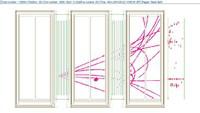-

- Oser
The past decade has shown us that, contrary to expectations, neutrinos have both masses and mixings between flavors. In a study of contrasts, their masses are ridiculously small, but the rates at which neutrinos change from one flavor to another are remarkably large. T2K is a new experiment to study what happens to a beam of neutrinos as it passes through the Honshu island in Japan. By shoot a beam of muon neutrinos from Japan's Pacific coast to the Super-Kamiokande detector 295km away, T2K hopes to observe muon neutrinos turning into electron neutrinos. This measurement is the cornerstone of a long-term effort to determine if neutrinos and anti-neutrinos behave identically, and may ultimately address the question of why our universe is made of matter and not anti-matter. I will present the first oscillation results from T2K and report on the current status of the experiment, including recovery efforts after the March 11 earthquake.

